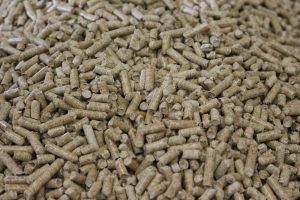Forest NB members heat thousands of New Brunswick homes with wood pellets
With the holidays just around the corner, many New Brunswickers are firing up woodstoves to keep their homes warm for the season’s festivities. While some are turning up their thermostats, others are filling their stoves with wood pellets.
Three Forest NB members, H.J. Crabbe & Sons Ltd. in Florenceville-Bristol, Marwood Limited in Traceyville and Groupe Savoie in Saint-Quentin, are prominent manufacturers of wood pellets used for heating homes in the province.
Pellets are an excellent example of the forest products industry’s commitment to sustainability and value-added products, as they are manufactured from recycled wood materials.
“With split wood it’s stacking, cutting, drying. It’s full of spiders, full of bugs, and quite a bit of hands on,” said Frank Vandenborre, industrial sales manager at Marwood Limited. “Pellets are somewhere in between electricity and burning wood. You get the convenience of going to the Home Hardware and picking up a bag of heat, there’s not a lot of ash to clean up afterwards.”
Vandenborre also notes that pelletizing wood is an efficient way to reduce waste. “You’ve already cut down a tree and you’re just using more of it,” he said.
Annually, Marwood Limited produces approximately 12,000 tonnes of pellets. Crabbe produces between 12,000-20,000 tonnes and Groupe Savoie, 90,000.
The pelletizing process begins with wood preparation. Round wood fibre is chipped, while sawdust, chips and shavings are fed through a grinder. The processed wood is then placed inside a rotary dryer that reduces its moisture content. From there, the wood is fed through another grinder and dropped into the pelletizer. Pressure squeezes the particles through a funnel. Heat generated from the pressure activates lignin, a natural adhesive occurring in wood. Softwood has more lignin, making it easier to pelletize than hardwood. The pellets are then cooled and bagged before being shipped or stored for inventory.
Forest NB executive director, Mike Legere, says pellet manufacturing is an economically sensible approach to recycling wood.
“From the industry’s perspective, any time you can fully utilize harvested trees it’s a good thing, especially when you’re adding value to what’s otherwise a residue or a low value product,” he said. “It’s a more complete utilization of the resource. It’s a good replacement for fossil fuels, given that forest based products are really our only truly renewable natural resource,” he said.


